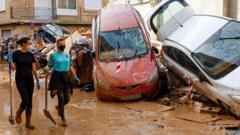As the political climate grows tenser, with calls for collective action seeming overshadowed by finger-pointing, the urgent need for effective crisis management and genuine reassurances for communities affected by the floods has never been clearer.
The situation began with the eastern regions of Spain being struck by severe flash floods, a disaster claimed to be the worst in living memory. While initial remarks suggested a unified response from leaders, this sentiment swiftly dissolved, leading to mutual accusations of negligence in emergency preparedness and response.
On October 29, Valencia’s leader Carlos Mazón was criticized for ignoring a critical red weather warning issued by the national meteorological office, Aemet, and failing to communicate effectively with local residents in time. This delay reportedly allowed the floodwaters to wreak havoc before adequate warnings could be disseminated. Despite a moment of cooperation with Prime Minister Pedro Sánchez - where Mazón referred to him as "dear prime minister" – the conservative PP's national leader, Alberto Núñez Feijóo, expressed concerns about the government's lack of coordination and questioned the reliability of Aemet’s data.
As the salvage operations progressed, as many as fifteen thousand military personnel and emergency responders were deployed to aid in rescuing those caught in the floods. The contention continued when Mazón refuted claims that his administration did not request military assistance adequately, insisting that the onus was on the armed forces to assess and allocate resources.
Tensions heightened further when political figures, such as the PP’s Núñez Feijóo and far-right Vox leader Santiago Abascal, pushed for a national state of emergency, a move rejected by the Sánchez administration, which emphasized the necessity of regional authority in handling the disaster. As shared frustrations escalated, public anger culminated in hostile interactions during a visit from King Felipe, Sánchez, and Mazón to the hard-hit region of Paiporta, where they faced protests labeling them as “murderers.”
In response to escalating demands for accountability and to address the mounting criticism, the Valencia government proposed significant funding for the reconstruction efforts, while the Prime Minister announced initial aid packages. Yet the focus remains not only on the proposed financial assistance but on restoring public trust, underscoring the urgent need for cooperation amongst political leaders amidst the challenges of crisis management.
In light of these events, what remains clear is the overwhelming desire of citizens for their leaders to collaborate effectively rather than engage in blame games, particularly in the face of such tragic loss.
The situation began with the eastern regions of Spain being struck by severe flash floods, a disaster claimed to be the worst in living memory. While initial remarks suggested a unified response from leaders, this sentiment swiftly dissolved, leading to mutual accusations of negligence in emergency preparedness and response.
On October 29, Valencia’s leader Carlos Mazón was criticized for ignoring a critical red weather warning issued by the national meteorological office, Aemet, and failing to communicate effectively with local residents in time. This delay reportedly allowed the floodwaters to wreak havoc before adequate warnings could be disseminated. Despite a moment of cooperation with Prime Minister Pedro Sánchez - where Mazón referred to him as "dear prime minister" – the conservative PP's national leader, Alberto Núñez Feijóo, expressed concerns about the government's lack of coordination and questioned the reliability of Aemet’s data.
As the salvage operations progressed, as many as fifteen thousand military personnel and emergency responders were deployed to aid in rescuing those caught in the floods. The contention continued when Mazón refuted claims that his administration did not request military assistance adequately, insisting that the onus was on the armed forces to assess and allocate resources.
Tensions heightened further when political figures, such as the PP’s Núñez Feijóo and far-right Vox leader Santiago Abascal, pushed for a national state of emergency, a move rejected by the Sánchez administration, which emphasized the necessity of regional authority in handling the disaster. As shared frustrations escalated, public anger culminated in hostile interactions during a visit from King Felipe, Sánchez, and Mazón to the hard-hit region of Paiporta, where they faced protests labeling them as “murderers.”
In response to escalating demands for accountability and to address the mounting criticism, the Valencia government proposed significant funding for the reconstruction efforts, while the Prime Minister announced initial aid packages. Yet the focus remains not only on the proposed financial assistance but on restoring public trust, underscoring the urgent need for cooperation amongst political leaders amidst the challenges of crisis management.
In light of these events, what remains clear is the overwhelming desire of citizens for their leaders to collaborate effectively rather than engage in blame games, particularly in the face of such tragic loss.
















